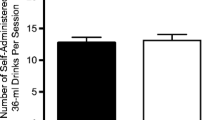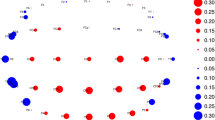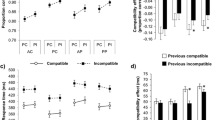Abstract
This study tested placebo responses in psychomotor performance when caffeine or alcohol was expected. Fifty male university students were assigned to one of four placebo groups or to a no-treatment control group. Two groups received placebo caffeine and two received placebo alcohol. Subjects performed 12 trials on a pursuit rotor task and performance was measured by the percent time on target. Then they received information about the expected drug effect on the task. One caffeine placebo group (C+) and one alcohol placebo group (A+) were led to expect enhanced performance on the task. The other caffeine placebo group (C−) and alcohol placebo group (A−) were led to expect impaired performance. Subjects subsequently performed 12 trials on the task. An interaction was obtained between the expected type of effect and the expected type of drug. The C+ group displayed superior performance compared to the C− group, and the reverse relationship was observed between the A+ and A− group. In addition, subjects led to expect alcohol-induced impairment (A−) performed better than subjects led to expect caffeine-induced impairment (C−). Subjects also reported greater motivation to resist impairment when they expected alcohol rather than caffeine. The research indicates that understanding and predicting placebo responses may require consideration of the drug that is expected as well as its expected effect.
Similar content being viewed by others
References
Connors G, Maisto S (1980) Effects of alcohol, instructions, and consumption rate on motor performance. J Stud Alcohol 41:509–517
Fillmore M, Vogel-Sprott M (1992) Expected effect of caffeine on motor performance predicts the type of response to placebo. Psychopharmacology 106:209–214
Hull J, Bond C (1986) Social and behavioral consequences of alcohol consumption and expectancy: a meta-analysis. Psychol Bull 99:347–360
Kirsch I, Weixel LJ (1988) Double-blind verses deceptive administration of a placebo. Behav Neurosci 102:319–323
Knight LJ, Barbaree HE, Boland FJ (1986) Alcohol and the balanced-placebo design: the role of experimenter demands in expectancy. J Abnorm Psychol 95:335–340
Lang AR, Goeckner DJ, Adesso VJ, Marlatt GA (1975) Effects of alcohol on aggression in male social drinkers. J Abnorm Psychol 84:508–518
Maisto SA, Connors GJ, Sachs PR (1981) Expectation as a mediator in alcohol intoxication: A reference level model. Cognit Ther Res 5:1–18
Marlatt GA, Rohsenow D (1980) Cognitive processes in alcohol use: expectancy and the balanced placebo design. In: Mello, NK (ed) Advances in substance abuse. J.A.I. Press Inc., Greenwich, Connecticut, pp 159–199
Martin CS, Earleywine M, Finn PR, Young RD (1990) Some boundary conditions for effective use of alcohol placebos. J Stud Alcohol 51:500–505
Rimm D, Sininger R, Faherty J, Whitley M, Perl M (1982) A balanced placebo investigation of the effects of alcohol vs. alcohol expectancy on simulated driving behavior. Addict Behav 7:27–32
Vogel-Sprott M (1992) Alcohol tolerance and social drinking: learning the consequences. Guilford, New York
Vogel-Sprott M, Sdao-Jarvie K (1989) Learning alcohol tolerance: the contribution of response expectancies. Psychopharmacology 98:289–296
Vuchinich R, Sobell M (1978) Empirical separation of physiologic and expected effects of alcohol on complex perceptual motor performance. Psychopharmacology 60:81–85
Vuchinich RE, Tucker JA, Sobell MB (1979) Alcohol, expectancy, cognitive labeling, and mirth. J Abnorm Psychol 88:641–651
Williams RM, Goldman MS, Williams DL (1981) Expectancy and pharmacological effects of alcohol on human cognitive and motor performance: the compensation for alcohol effect. J Abnorm Psychol 90:267–270
Wilson GT, Abrams D (1977) Effects of alcohol on social anxiety and physiological arousal: cognitive versus pharmacological processes. Cognit Ther Res 1:195–210
Wilson GT, Lawson DM (1976) Expectancies, alcohol, and sexual arousal in male social drinkers. J Abnorm Psychol 85:587–594
Author information
Authors and Affiliations
Additional information
This work was supported in part by a Natural Sciences and Engineering Research Council of Canada Grant A8321 to the third author and by a grant from the Alcoholic Beverage Medical Research Foundation.
Rights and permissions
About this article
Cite this article
Fillmore, M.T., Mulvihill, L.E. & Vogel-Sprott, M. The expected drug and its expected effect interact to determine placebo responses to alcohol and caffeine. Psychopharmacology 115, 383–388 (1994). https://doi.org/10.1007/BF02245081
Received:
Revised:
Issue Date:
DOI: https://doi.org/10.1007/BF02245081




